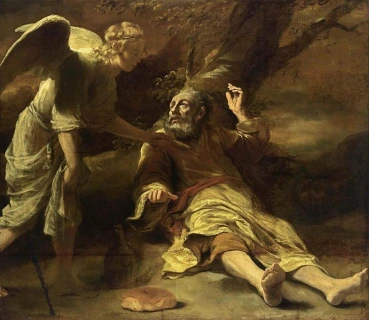This week we are reading about Elijah’s journey to Mount Horeb. Please read and re-read 1 Kings 19. As a result of his victory on Mount Carmel, Elijah experiences exile, God’s presence, and ultimately his being replaced. As you read through the story think about how Elijah’s story is our story and also how Elijah’s story points to the more perfect story of Jesus.
Jezebel’s Revenge: (1 Kings 19:1-3)
In the last chapter, God tells Elijah to go tell Ahab that the drought will be ending. 1 Kings 18:1. Elijah, in his zeal for the Lord, goes one step further and sets up the Contest on Mount Carmel. There, Elijah and his God Yahweh prevail over Jezebel’s God Baal, and Elijah slaughters the 450 prophets of Baal. Elijah has conclusively won the day for himself and for his God. After the contest, the rains came and the drought ended.
The reading this week opens with Ahab reporting to his wife what occurred on Mount Carmel. Jezebel is unimpressed with the show of Yahweh’s dominance. Her loyalty to her God Baal is invulnerable to the miraculous displays on Mount Carmel. Jezebel sends word to Elijah that by the morrow, he too will suffer the fate that he meted out to her prophets.
Elijah in the Wilderness: (1 Kings 19:4-8)
Elijah flees to the town of Beersheba, which is the southernmost settlement of the southern kingdom of Judah. Beersheba was founded by Abraham who set up a shrine there. Gen. 21:33. It was a place where Isaac (Gen. 26:24), Jacob (Gen. 46:2), and Hagar (Gen. 21:17) encountered God. From there, Elijah journeyed into the wilderness and prayed for God to take his life.
Elijah had mistakenly convinced himself that his miraculous victory on Carmel had conclusively converted the king and the people from idolatry and that he had successfully bent their will to his charismatic authority and the divine will. Jezebel simply refused to go along with Elijah’s show of power. Elijah now believes that his victory was ephemeral and his mission to uproot Baal worship in Israel had failed. He sees himself as a failure and now he wants to die. He believes that he has failed God and now he asks God for only one more favor.
God, however, has not given up on Elijah. An angel, God’s messenger, comes to Elijah. He awakens him, feeds him, and allows him to rest further. A second time the angel comes and tells Elijah that he must eat more because he is to make a journey. The angel never tells Elijah where to go, Elijah simply seems to know that he must make the forty-day journey to Mount Horeb. (Mount Horeb is another name for Mount Siani.) Horeb is the mountain where Moses saw the burning bush and where God gave Israel the Ten Commandments. Ex. 3, Deut. 5:2. Elijah is journeying back to the birthplace of God’s covenant with Israel.
Elijah as Us:
Think of how Elijah’s journey thus far reflects your own spiritual journey. Personally, I see myself in three places in Elijah’s story thus far. One, is my perceived need to defend God and thus making him into an idol; two is a depression and perceived failure when things religious do not work out the way I intended; and three is God’s continued rescue of me.
First, like Elijah, I often believe that is my duty to defend God. Like Peter pulling his sword in the garden of Gethsemane (John 18:10), sometimes I think that God needs defending. This is why Elijah set up the Contest on Mount Carmel. He wanted God to step up in violence and show his power to the world and his enemies. Like the Crusaders, we want to convert others, if not by force of arms, then at least by a force of argument. In wanting to do so, the story is no longer about God, but us. Elijah needs the Contest on Mount Carmel more for himself and to justify himself, than God does.
Second, in this situation, when I fail, I feel like I have failed God. Elijah prevailed on Mount Carmel, but his victory was very short-lived. When we believe that it is all up to us, then any failure is on us as well. Elijah’s failure was of a divine magnitude. But Elijah did not fail God, he only failed himself and his perceived self-importance
Finally, in my failures, God is always there to pick me up, to feed me, and to carry me forward on my journey. In our failures, God leads us back to the fundamentals and back to the very basis of his covenant so that we can once more learn from him. God will not allow our failures to be final.
For Tuesday night’s discussion, see where you see yourself in the story.
Dinner is at 6. The menu is shepherd’s pie. Discussion about 6:45. Hope to see you here!
Concepts create idols; only wonder comprehends anything. People kill one another over idols. Wonder makes us fall to our knees.
Saint Gregory Of Nyssa

